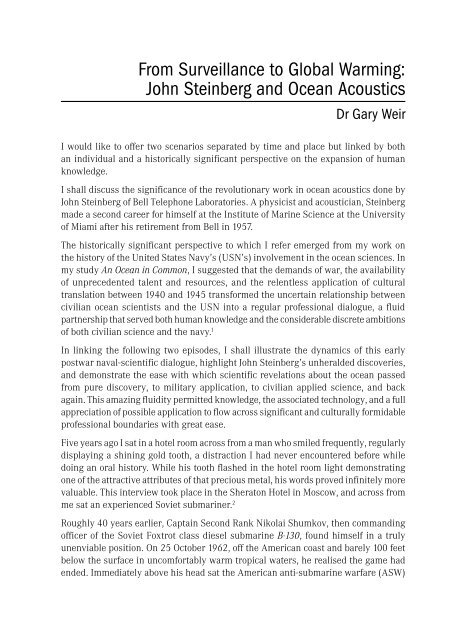Australian Maritime Issues 2007 - Royal Australian Navy
Australian Maritime Issues 2007 - Royal Australian Navy
Australian Maritime Issues 2007 - Royal Australian Navy
You also want an ePaper? Increase the reach of your titles
YUMPU automatically turns print PDFs into web optimized ePapers that Google loves.
From Surveillance to Global Warming:<br />
John Steinberg and Ocean Acoustics<br />
Dr Gary Weir<br />
I would like to offer two scenarios separated by time and place but linked by both<br />
an individual and a historically significant perspective on the expansion of human<br />
knowledge.<br />
I shall discuss the significance of the revolutionary work in ocean acoustics done by<br />
John Steinberg of Bell Telephone Laboratories. A physicist and acoustician, Steinberg<br />
made a second career for himself at the Institute of Marine Science at the University<br />
of Miami after his retirement from Bell in 1957.<br />
The historically significant perspective to which I refer emerged from my work on<br />
the history of the United States <strong>Navy</strong>’s (USN’s) involvement in the ocean sciences. In<br />
my study An Ocean in Common, I suggested that the demands of war, the availability<br />
of unprecedented talent and resources, and the relentless application of cultural<br />
translation between 1940 and 1945 transformed the uncertain relationship between<br />
civilian ocean scientists and the USN into a regular professional dialogue, a fluid<br />
partnership that served both human knowledge and the considerable discrete ambitions<br />
of both civilian science and the navy. 1<br />
In linking the following two episodes, I shall illustrate the dynamics of this early<br />
postwar naval-scientific dialogue, highlight John Steinberg’s unheralded discoveries,<br />
and demonstrate the ease with which scientific revelations about the ocean passed<br />
from pure discovery, to military application, to civilian applied science, and back<br />
again. This amazing fluidity permitted knowledge, the associated technology, and a full<br />
appreciation of possible application to flow across significant and culturally formidable<br />
professional boundaries with great ease.<br />
Five years ago I sat in a hotel room across from a man who smiled frequently, regularly<br />
displaying a shining gold tooth, a distraction I had never encountered before while<br />
doing an oral history. While his tooth flashed in the hotel room light demonstrating<br />
one of the attractive attributes of that precious metal, his words proved infinitely more<br />
valuable. This interview took place in the Sheraton Hotel in Moscow, and across from<br />
me sat an experienced Soviet submariner. 2<br />
Roughly 40 years earlier, Captain Second Rank Nikolai Shumkov, then commanding<br />
officer of the Soviet Foxtrot class diesel submarine B-130, found himself in a truly<br />
unenviable position. On 25 October 1962, off the American coast and barely 100 feet<br />
below the surface in uncomfortably warm tropical waters, he realised the game had<br />
ended. Immediately above his head sat the American anti-submarine warfare (ASW)
















